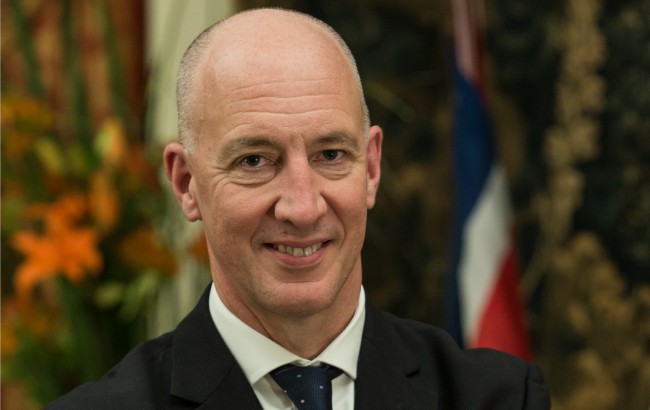SWA CEO Mark Kent on the future of Scotch
By Melita KielyBy his own admission, Mark Kent, chief executive of the Scotch Whisky Association, has “the best job in the world”. Ahead of World Whisky Day (21 May), he reflects on his first few months at the helm of the trade association and the future of Scotch.

Mark Kent joined the Scotch Whisky Association (SWA) as chief executive after a period of significant turbulence for the category. The past few years have seen the sector endure a global pandemic, the UK’s departure from the European Union, and punitive tariffs from the US. But despite the trials and tribulations, Kent’s optimism for the sector abounds.
“With the turn to spring comes World Whisky Day [21 May], held annually on the third Saturday in May,” Kent says. “It gives me a chance to reflect on my first few months in the role and to look ahead to what the future holds for the Scotch whisky industry.
“Having spoken to distillers, blenders, bottlers and exporters from Speyside to Islay, and everyone in between, it is clear that the industry is looking to the future after a couple of years of turbulence. Ultimately, people working across the industry want to focus on making a world-class spirit, attracting new consumers to discover Scotch, and opportunities to invest, grow and support jobs and communities in Scotland and across the world.”
The CEO does, however, remain a realist about the challenges that continue to affect the Scotch whisky sector. After all, the effects of the Covid-19 pandemic, and more recent issues such as the Russian war against Ukraine, continue to impact the industry.
“As everyone knows right now, there is a squeeze on the cost of living, which impacts industry as much as it impacts household budgets,” Kent adds. “In recent weeks, the cost of glass, cereals, packaging and energy have all increased significantly. The price of wheat, for example, a key ingredient in the production of grain whisky used in every blended Scotch whisky, has increased by 60% since the turn of the year.
“These pressures of the supply chain of the industry remain a brake on the ambitions of the industry to recapture growth lost over the last couple of years.”
Alleviating pressure on Scotch whisky

Kent’s work, moving forward, will involve lobbying the UK government to implement changes that will alleviate some of the pressure being felt by the Scotch trade. That will include “looking to the chancellor, Rishi Sunak” for support in the autumn budget, such as re-assessing the “70% tax burden on Scotch whisky in the UK”.
“Time and time again, the industry has shown that more revenue can be generated from freezing or cutting duty rates – this should be a compelling argument for HM Treasury as it looks to increase government revenue and support the UK’s world-class distilling sector,” Kent stresses.
Another key area of focus for Kent, in order to enhance the Scotch whisky industry’s global presence, is to secure reduced rates in India. For decades, the potentially lucrative market has been tricky for Scotch whisky producers to crack due to triple-digit tariffs.
“India is a massive opportunity for the Scotch whisky industry – reducing the 150% tariffs has long been a goal, but it feels like the prospect of getting a deal across the line is as close as it has ever been,” Kent enthuses.
“The modelling we have done shows it will be a win-win – boosting Scotch whisky exports by £1 billion [US$1.25bn] over five years and creating 1,300 new jobs across the UK, while boosting investment in India and generating £3.4bn [US$4.24bn] in additional tax revenue. It is now for the negotiators to find that path to a deal – and I look forward to visiting India later this year to do what I can to support their efforts.”
Sustainability key to future success
Business will only be able to grow hand in hand with sustainability, however. Kent says the word ‘sustainability’ has been “mentioned more than any other on my travels around the industry”.
Last year, with the COP26 conference in Glasgow, the Scotch sector outlined its goal to reach net zero in its operations by 2040. The target will be reached by utilising new and existing technologies, such as anaerobic digestion, biomass, hydrogen, and high-temperature heat pumps, to reduce the industry’s reliance on natural gas energy sources.
“This will not be easy; there is no silver bullet, and some of the technology needed to reach the goal doesn’t exist yet or isn’t scalable for an industry the size of Scotch whisky,” Kent says. “So if last year was about aspiration, this year is about delivery.
“And I have seen an industry determined to take the necessary action to secure a more sustainable future. It is exciting to be part of it, and think that in a small way our efforts will safeguard the industry and its contribution to wider society for generations to come.”
After all is said and done, Kent is steadfast in his career choice and optimistic outlook: “Best job in the world? Whisper it quietly, but I think it might just be.”
Related news
Famous Grouse on the power of sports partnerships
